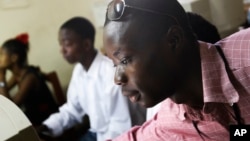Children in rural Cameroon generally receive a poor education, if any education at all. But the government is betting that learning by computer can help fill the gap.
Nine-year-old Charles Ngam Eboua lives in Bare, a small village in southwestern Cameroon. He speaks French and English despite never having attended school.
When Charles was 2 years-old, his father returned home from Yaounde, where he had been educated. He introduced his son to the computer. "I started talking when I was one-and-half-years-old. Then at two-years-old, they started taking me to read letters and count numbers. I learned human biology, botany and zoology. Physics, I will learn when I am bigger," he recalled.
Charles now helps other children in the village. He and his father have two laptops, three tablets and a generator to keep the devices powered up. They download free educational applications from the internet and use search engines to find new material.
According to Cameroon's Institute of Statistics, 70 percent of children in rural areas do not go to school because of poverty or because schools are too far away or are not adequately staffed. Illiteracy rates in rural areas are high.
Charles' father Eboua Ngothy said electronic learning, or e-learning, could be a solution. He said his son is an example. "He is a pure e-learner. He has never attended any traditional school, never. He learns essentially at home and when he goes to school, he assists with tutorials essentially. For example, we can teach mathematics and after we give him tutorials to explain to other students who are much more older than him," he said.
The government of Cameroon is fully behind the idea. Workers recently began constructing the first of a projected 200 computer centers around the country. The centers, with about 20 computers each, are designed to promote e-learning in rural areas.




